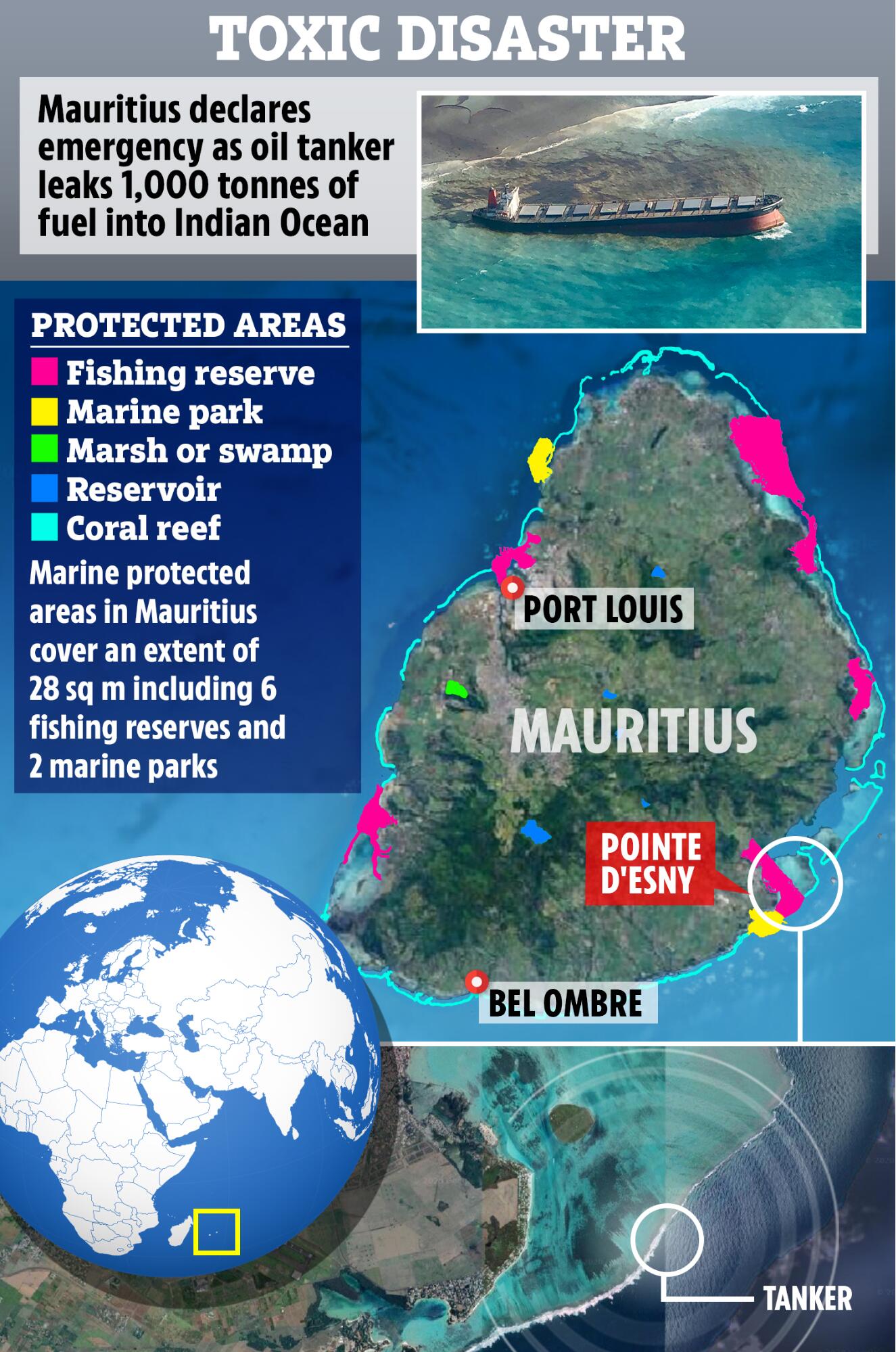Biodiversity & Environment
Oil Spill in Mauritius
- 17 Aug 2020
- 6 min read
Why in News
A japanese bulk-carrier ship MV Wakashio which was carrying fuel oil has split into two parts near Blue Bay Marine Park in south-east Mauritius.
- The ship was already leaking and has caused an oil spill of over 1000 tonnes in the Indian Ocean.
Key Points
- The vessel has broken near Pointe d'esny in Mauritius and the area has many environmentally sensitive zones.
- Effects: The oil spill threatens the ecology of the coastline of Mauritius and the marine life in the Indian Ocean.
- It endangers the already endangered coral reefs, seagrasses in the shallow waters, mangroves, the fishes and other aquatic fauna.
- Some key wildlife at risk include: Giant tortoises, endangered green turtle, and the Pink Pigeon.

- The pink pigeon (Nesoenas mayeri) is a species of pigeon, endemic to the Mascarene island of Mauritius.
- It has been listed as ‘vulnerable’ in the International Union for Conservation of Nature (IUCN) Red List of Threatened Species.
- Liability: Under the International Convention on Civil Liability for Bunker Oil Pollution, 2001, the owners of vessels are responsible for damage caused by oil leaks.
- This convention, also known as BUNKER convention, came into force in 2008 and is administered by the International Maritime Organization (IMO).
- The Convention was adopted to ensure that adequate, prompt, and effective compensation is available to persons who suffer damage caused by spills of oil, when carried as fuel in ships' bunkers.
- Blue Bay Marine Park: It is designated as a Wetland of International Importance by Ramsar Convention.
- The presence of coral reefs, mangroves, seagrass meadows, and macro algae make it an ecologically sensitive zone.
Oil Spill
- Definition: An oil spill refers to any uncontrolled release of crude oil, gasoline, fuels, or other oil by-products into the environment. Oil spills can pollute land, air, or water, though it is mostly used for oceanic oil spills.
- Cause: They have become a major environmental problem, chiefly as a result of intensified petroleum exploration and production on continental shelves and the transport of large amounts of oils in vessels.
- Environmental Impacts
- Oil on ocean surfaces is harmful to many forms of aquatic life because it prevents sufficient amounts of sunlight from penetrating the surface, and it also reduces the level of dissolved oxygen.
- Crude oil ruins the insulating and waterproofing properties of feathers and fur of birds, and thus oil-coated birds and marine mammals may die from hypothermia (decrease in body temperature to below-normal levels).
- Moreover, ingested oil can be toxic to affected animals, and damage their habitat and reproductive rate.
- Saltwater marshes and mangroves frequently suffer from oil spills.
- Experts say that despite best efforts, generally less than 10% of oil spilled in incidents like these is successfully cleaned up.
- Economic Impacts:
- If beaches and populated shorelines are fouled, tourism and commerce may be severely affected.
- The power plants and other utilities that depend on drawing or discharging sea water are severely affected by oil spills.
- Major oil spills are frequently followed by the immediate suspension of commercial fishing.
- Cleanup of Oil Spill:
- Containment Booms: Floating barriers, called booms are used to restrict the spread of oil and to allow for its recovery, removal, or dispersal.
- Skimmers: They are devices used for physically separating spilled oil from the water’s surface.
- Sorbents: Various sorbents (e.g., straw, volcanic ash, and shavings of polyester-derived plastic) that absorb the oil from the water are used.
- Dispersing agents: These are chemicals that contain surfactants, or compounds that act to break liquid substances such as oil into small droplets. They accelerate its natural dispersion into the sea.
- Biological agents: Nutrients, enzymes, or microorganisms such as Alcanivorax bacteria or Methylocella silvestris that increase the rate at which natural biodegradation of oil occurs are added.
- Other Incidents of Oil Spills:
- Recently, Russia declared a state of emergency in its Krasnoyarsk Region after a power plant fuel leaked causing 20,000 tonnes of diesel oil to escape into the Ambarnaya River.
- In 2010, the Deep Water Horizon incident off the Gulf of Mexico saw nearly 400,000 tonnes of oil spill, resulting in the death of thousands of species ranging from plankton to dolphins
- In 1978, a large crude oil carrier ran aground off the coast of Brittany, France, which leaked nearly 70 million gallons of oil into the sea, killing millions of invertebrates and an estimated 20,000 birds






